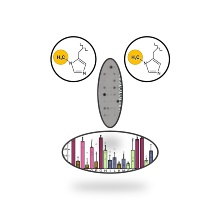New publication in "Nature Communications"
In this work, we explored post-translational methylation of proteins which plays a crucial role in regulating various aspects of the function of proteins. Histidine methylation is a relatively rare and understudied protein modification. In this work, we investigated the METTL9 protein and showed that it represents a novel protein histidine methylation. The enzyme has a preference for methylation of the first histidine in HXH sequences, where X should be a small amino acid residue (preferentially A, N, G, S or T). Based on this, several cellular peptide and proteins substrates of METTL9 were discovered. Overall, METTL9 mediates the formation of the majority of 1-methylhistidine present in mouse and human proteomes including methylation of the NDUFB3 subunit of mitochondrial respiratory complex I, which was shown to enhance aerobic respiration.


